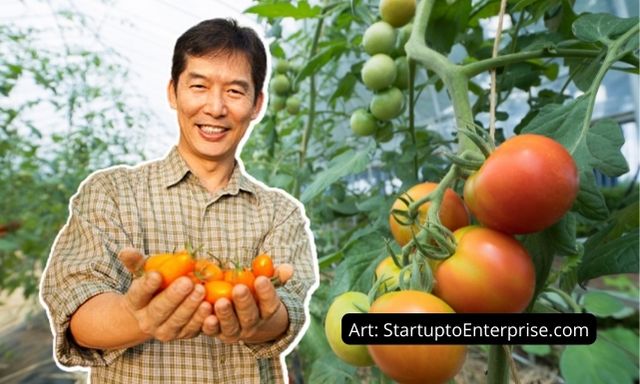

Precision greenhouse management technology developed by agriculturists and data scientists participating in Pinduoduo’s Smart Agriculture Competition is easy to use and does not need training for growers.
TomaGrow, a team primarily comprised of Wageningen University & Research and China Agricultural University graduates with extensive industry experience, emerged victorious in the tomato-growing greenhouse challenge. It was decided by factors, including yield, nutritional value and environmental sustainability. In the preliminary round of the competition, more than 120 researchers from 15 teams were nominated.
To cultivate tomatoes remotely during the six-month challenge, contestants used a variety of approaches that included nutrition science and computer vision, as well as deep learning. They demonstrated the ability to control growing operations from afar by adjusting variables such as the humidity and lighting levels. In the words of experts, the teams could produce double the yields of conventional growers. According to an inspection report from a leading food testing institute, the nutritional value is also among the best in the industry.
The Smart Agriculture Competition is being held for the second time by Pinduoduo. With the help of the United Nations Food and Agriculture Organization (FAO) and the Wageningen University & Research (WUR) in Holland, the company organized this year’s event in China. Competitors were also measured on their carbon footprint to set benchmarks for future comparisons.
It’s time for “innovative solutions that sustainably nourish people while nurturing our planet,” said Carlos Watson, FAO’s representative in China. Young people, technologists, innovators, the private sector, and research institutes can all come together through the Smart Agriculture Competition to develop practical solutions for the issues that smallholder farmers face daily.
The Pinduoduo Smart Agriculture Competition has become a platform for young, talented agricultural researchers to work on real-life “pain points” and develop practical solutions. About 80% of the participants are in their 20s or younger.
“We want to encourage more young people to make a meaningful impact in agriculture through technology,” said Li Daoliang, Dean of the International College of China Agricultural University. This new generation of agricultural innovators is critical to the modernization of the industry.
The emphasis on commercial viability, productivity, and sustainability is one of the competition’s unique features. For practicality and cost-effectiveness, all four finalists included commercial growers in their development teams.
An easy-to-use greenhouse management model incorporating algorithms and sensors developed by TomaGrow, the winning team, can be used by farmers without special training. With the help of this model, farmers were given a one-week window of opportunity to intervene and avoid losses.
“Agriculture has a very low tolerance for mistakes. Once a disease has taken hold, it can have devastating consequences, “TomaGrow’s team leader, Xu Dan, agreed. The model will be tested in large-scale pilot projects in Beijing and Yunnan to make the product available commercially to tomato growers across China.
In addition to Hamato and CyberTomato, two other finalist teams with academic backgrounds intend to promote their greenhouse management systems to Chinese growers to increase productivity and decrease costs through improved efficiencies.
Hamato developed low-cost and pollution-free carbon dioxide enrichment equipment to boost plant growth. Using visual recognition technology, CyberTomato trained computers to recognize how well the tomatoes were growing, allowing farmers to make better decisions about irrigation and harvesting and thus improve their yields.
According to the Zhejiang University dean of Biosystems Engineering and Food Science College, “The event provides a good opportunity for young scientists to understand the technology is being developed for.” Expanding their perspective and gaining valuable information for future research will benefit them greatly from this experience.”
It’s part of Pinduoduo’s support of the agricultural industry’s efforts to use technology to better it and modernize it. Agricultural production has been a major part of its strategy since it was founded in 2015.
As China’s largest agriculture platform, Pinduoduo connects 16 million farmers directly to over 850 million consumers. A ten-billion-dollar agriculture initiative, unveiled in August of last year, aims to meet urgent demands in the agricultural sector and rural areas. In addition to the competition, the company is working with Wageningen University & Research on a project to improve tomato quality through environmentally-friendly growing methods.
Andre Zhu, a senior vice president at Pinduoduo, says that technology is the driving force behind the improvement of the agricultural industry. To improve food security and quality long-term, “we want to contribute.”
Since its inception in 2015, Pinduoduo Inc. (Nasdaq:PDD) has grown to become China’s largest online marketplace for agricultural goods. More than 16 million farmers and their communities have benefited from our platform, which has helped them participate in and benefit from the rapidly expanding digital economy.
Dear Reader,
First, thank you for your precious time reading the stories (without paywalls) I publish on Startups to Enterprises covering the EU, China, the US, and India. Second, I request you to contribute financially (any amount) to help me sustain this as an independent digital business news media.
If I receive a request for a sponsored post, I ensure I see merit that is meaningful for erudite and informed readers like you. In the bargain, I lose out on sponsorships wherein I need funds to sustain this effort. Your contribution helps me stay afloat.
Please note that your contribution is treated as revenue generated and not a donation; hence, there are no 80G or other donation certificates. In fact, as I am eligible to pay for the revenue generated, I will pay taxes on the same.
You deserve to know that I abide by journalistic ethics and practices to ensure I tell the stories as is, unbiased. You can follow us on Facebook, Linkedin, and Twitter, bookmark us on Google News, and finally, PayPal us here.
Founding Editor
Linda Ashok
